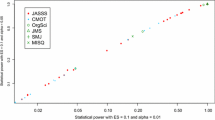Abstract
As extensive experimental research has shown individuals suffer from diverse biases in decision-making. In our paper we analyze the effects of decision-making biases of managers in collaborative decision processes on organizational performance. The analysis employs an agent-based simulation model which is based on the NK model. In the simulations, managerial decisions which are based on different levels of organizational complexity and different incentive systems suffer from biases known from descriptive decision theory. The results illustrate how biases in combination with each other and in different organizational contexts affect organizational performance. We find that, contrary to intuition, some combinations of biases significantly improve organizational performance while these biases negatively affect organizational performance when they occur separately. This might evoke considerations whether decision-making should be as rational as possible.
Access this chapter
Tax calculation will be finalised at checkout
Purchases are for personal use only
Preview
Unable to display preview. Download preview PDF.
Similar content being viewed by others
References
Simon, H.A.: A behavioral model of rational choice. Quarterly Journal of Economics 69, 99–118 (1955)
Bredenkamp, J., Wippich, W.: Lern- und Gedächtnispsychologie I. Kohlhammer W. (1989)
Samuelson, W., Zeckhauser, R.: Status quo bias in decision making. Journal of Risk and Uncertainty 1(1), 7–59 (1988)
Tversky, A., Kahneman, D.: Judgment under uncertainty: Heuristics and biases. Science 185(4157), 1124 (1974)
Kahneman, D., Tversky, A.: The framing of decisions and the psychology of choice. Science, New Series 211(4481), 453–458 (1981)
Bonabeau, E.: Agent-based modeling: methods and techniques for simulating human systems. Proceedings of the National Academy of Sciences of the United States of America 99(suppl. 3), 7280–7287 (2002)
Moss, S.: Editorial introduction: Messy systems - the target for multi agent based simulation. In: Moss, S., Davidsson, P. (eds.) MABS 2000. LNCS (LNAI), vol. 1979, pp. 1–14. Springer, Heidelberg (2001)
Van Dyke Parunak, H., Savit, R., Riolo, R.L.: Agent-based modeling vs. Equation-based modeling: A case study and users’ guide. In: Sichman, J.S., Conte, R., Gilbert, N. (eds.) MABS 1998. LNCS (LNAI), vol. 1534, pp. 10–25. Springer, Heidelberg (1998)
Kauffman, S.: The origins of order: Self-Organization and Selection in Evolution, vol. 209. Oxford University Press, New York (1993)
Kauffman, S., Levin, S.: Towards a general theory of adaptive walks on rugged landscapes. Journal of Theoretical Biology 128(1), 11–45 (1987)
Rivkin, J., Siggelkow, N.: Balancing search and stability: Interdependencies among elements organizational design. Management Science, 290–311 (2003)
Siggelkow, N., Levinthal, D.: Temporarily divide to conquer: Centralized, decentralized, and reintegrated organizational approaches to exploration and adaptation. Organization Science, 650–669 (2003)
Siggelkow, N., Rivkin, J.: Speed and search: Designing organizations for turbulence and complexity. Organization Science, 101–122 (2005)
Chang, M.-H., Harrington, J.E.: Agent-Based Models of Organizations. Handbook of Computational Economics: Agent-Based Computational Economics, vol. 2, ch. 26, pp. 1273–1337. Elsevier (2006)
Wall, F.: The (beneficial) role of informational imperfections in enhancing organisational performance. In: LiCalzi, M., Milone, L., Pellizzari, P. (eds.) Progress in Artificial Economics: Computational and Agent-Based Models. Lecture Notes in Economics and Mathematical Systems, vol. 645. Springer (2010)
Kristensen, H., Gärling, T.: Anchoring induced biases in consumer price negotiations. Journal of Consumer Policy 23(4), 445–460 (2000)
Kant, J.D., Thiriot, S.: Modeling one human decision maker with a multi-agent system: the codage approach. In: Proceedings of the Fifth International Joint Conference on Autonomous Agents and Multiagent Systems, AAMAS 2006, pp. 50–57. ACM, New York (2006)
An, L.: Modeling human decisions in coupled human and natural systems: Review of agent-based models. Ecological Modelling (2011)
Masatlioglu, Y., Ok, E.: Rational choice with status quo bias. Journal of Economic Theory 121(1), 1–29 (2005)
Author information
Authors and Affiliations
Editor information
Editors and Affiliations
Rights and permissions
Copyright information
© 2013 Springer-Verlag Berlin Heidelberg
About this paper
Cite this paper
Berlinger, S., Wall, F. (2013). Effects of Combined Human Decision-Making Biases on Organizational Performance. In: Giardini, F., Amblard, F. (eds) Multi-Agent-Based Simulation XIII. MABS 2012. Lecture Notes in Computer Science(), vol 7838. Springer, Berlin, Heidelberg. https://doi.org/10.1007/978-3-642-38859-0_3
Download citation
DOI: https://doi.org/10.1007/978-3-642-38859-0_3
Publisher Name: Springer, Berlin, Heidelberg
Print ISBN: 978-3-642-38858-3
Online ISBN: 978-3-642-38859-0
eBook Packages: Computer ScienceComputer Science (R0)




